NASHVILLE, Tennessee – The bill that lays out the details of Governor Bill Lee’s proposal for Education Savings Accounts (ESAs) passed its first hurdle in the House Curriculum, Testing & Innovation Subcommittee.
The 16-page amendment that “makes the bill” was presented by Speaker Pro Tem Bill Dunn (R-Knoxville), who is carrying the legislation as HB 0939 in the House before a standing room only House Hearing Room IV.
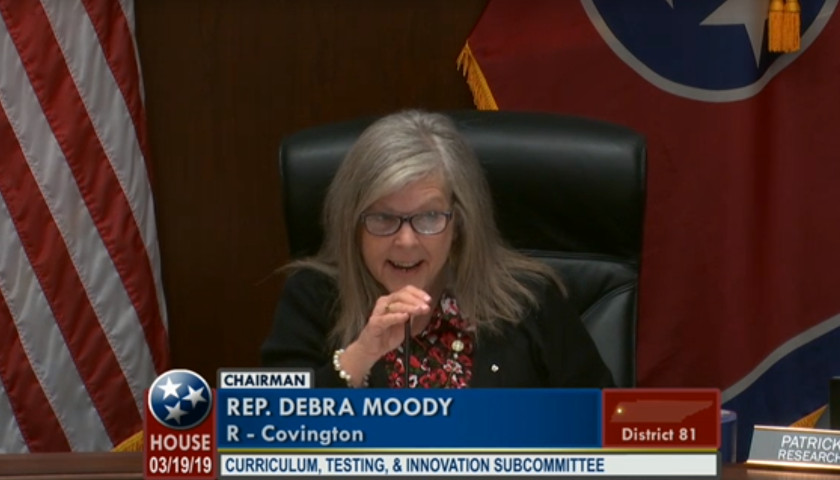 Of note were the many attendees wearing “children are more than a test score” stickers, something with the color red, or red Vision 20/20 shirts showing support for the Tennessee Education Association, the state affiliate of National Educators Association, the largest union in the country.
Of note were the many attendees wearing “children are more than a test score” stickers, something with the color red, or red Vision 20/20 shirts showing support for the Tennessee Education Association, the state affiliate of National Educators Association, the largest union in the country.
Earlier this year, Dunn was honored for his work on school choice when he was awarded the Tennessee Federation for Children’s 2019 Champion of Choice award, as reported by The Tennessee Star.
In his introduction of the bill, Dunn said, it comes to us from Governor Bill Lee and his administration and deals with school choice and the idea that each student is a unique individual and unique circumstances lead to different needs when it comes to education.
“We all know that Governor Lee, when he ran for his office, he made this a central part of what he would do and he has followed through on this promise,” Dunn said. “This was an issue in the election and Governor Lee won by 20 percentage points, so I think it’s obvious that people agreed with his approach here.”
Having been an advocate for school choice for some time, Dunn said, “The idea of having the education focused on the child and the child’s needs and letting families and students decide how best to get the best education is nothing new.”
Giving examples “done all the time in higher education,” the HOPE Scholarship where a certain sum of public dollars is given to the family to decide whether the University of Tennessee Knoxville is the best fit, a little small school like Maryville College or Vanderbilt and the federal government’s Pell grants were cited by Dunn.
Dunn then reminded the committee of a bill from a week or two prior sponsored by Chairman Andy Holt (R-Dresden), as he described it, dealing with education dollars following a Tennessee child in need of mental health services, even if it meant the dollars had to follow them out of state.
“So, every member on this committee is on record voting for that to say that even Tennessee tax dollars, it was okay to go out of state to actually make sure the children received what they needed at that time,” he said.
He then cited a bill, HB 1261, by fellow committee member Representative Vincent Dixie (D-Nashville), which deals with advanced placement classes that use public tax dollars to go to a private company to administer the tests, because the parents and students feel like that is what the child needs and the test is going to help them.
In spirited discussions with Knox County educators, Dunn repeated the school choices currently available, such as STEM Academy, magnet schools and public charter schools, which he said recognize that not one size fits all.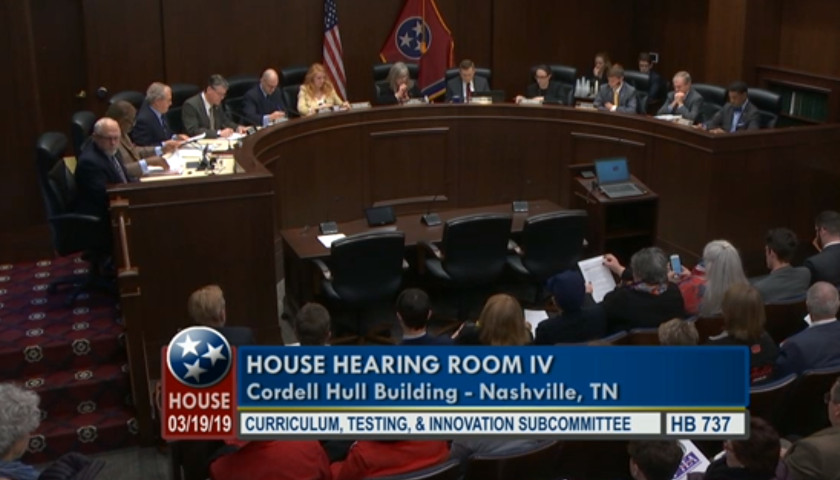
Dunn summed it up by saying, “While so much good can be given from our schools, it can’t be the best for every single student.”
“The Governor recognizes this, and through personal experience, he has seen how you can change the trajectory of a person’s life by changing the environment and some of the education stimulus they receive,” he added.
After Dunn introduced the bill, Subcommittee Chair Debra Moody (R-Covington) went out of session so that members of the administration, including Governor Lee’s Legislative Director Brent Easley, Department of Education Assistant Commissioner Elizabeth Fiveash and Department of Education Consultant Rebecca Wright, could answer more detailed questions about the legislation.
Easley went through the 16 pages of the amendment, calling out the larger provisions of the bill, including:
- defining eligible students
- defining school districts applicable as those with three or more schools on the cusp list, or the bottom 10 percent of schools
- income threshold as twice the eligible amount for free reduced lunch
- participating schools defined as Category I, II or III private schools
- eligible expenses
- student returning to the Local Education Agency (LEA) or leaving the state after participating in ESA
- application process
- student caps for the program at first year of 5,000 students, 7,500 the second year, 10,000 for the third year, 12,500 for the fourth year and 15,000 for the fifth year and how applications below the cap would be addressed
- how over-subscriptions will be prioritized
- funding through the grant process
- the administration of a parent satisfaction survey by the Department of Education
- the Department’s reporting on the program
- suspension or termination of a participating school or student by the Department of Education
- empowering the State Board of Education to promulgate rules
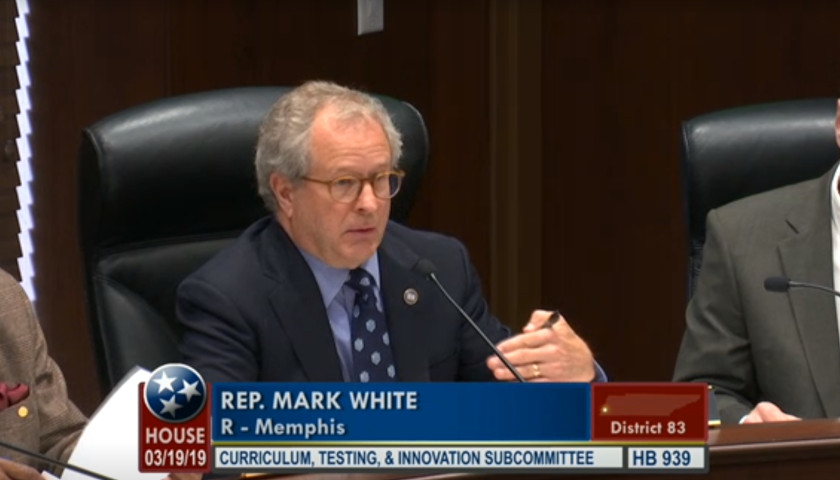 Subcommittee members Representatives John DeBerry (D-Memphis), Charlie Baum (R-Murfreesboro) and Dixie had obviously done their homework in studying the bill and asked detailed questions, citing specific sections of the amendment.
Subcommittee members Representatives John DeBerry (D-Memphis), Charlie Baum (R-Murfreesboro) and Dixie had obviously done their homework in studying the bill and asked detailed questions, citing specific sections of the amendment.
One of the concerns expressed by Baum was that participating students would be tested only on English and math and not on science and social studies. He went on to say that everybody there, without specifying who, is for standards and accountability. His point was that assessments would provide the proponents of ESAs evidence that they work, or otherwise give opponents the ability to say ESA participants didn’t take the full battery of tests.
Chairman of the full House Education Committee Mark White (R-Memphis), who is carrying Governor Lee’s legislation known as the charter authorizer under HB 0940, said he is a supporter of the concept of ESAs and has been for 10 years, but perhaps sensing some of the concerns of his fellow subcommittee members, added that he wants a good bill going forward.
As the details of the accounting pieces of the bill were being discussed, it was pointed out that similar provisions were included in the Individualized Education Account (IEA) Program. The IEA is a school choice program for eligible students with disabilities, passed by the Tennessee General Assembly in 2015 and the first IEAs awarded in 2017. The IEAs give parents and students access to public education funds to use toward approved educational expenses that best meet their unique needs.
Chair Moody said, as the House sponsor of the 2015 IEA legislation, that Rebecca Wright was a very wise choice oversee the program. Going through the year and a half rule making process on a brand new program, Moody said she learned a lot, and has the utmost confidence in how it was being run.
Easley explained the student’s state and local BEP recurring dollars would follow them to fund the program. In addition to that, the governor has dedicated $25 million in his budget this year to fund a grant program for three years that would go back to the districts the students are coming from that would be in an equal amount to the ESA following the student. That district could use those funds for school improvement post participation in the program.
With regard to the questions on the $25 million in funding set aside versus the estimated $35 million needed, Easley explained that it was due to students already being enrolled and switching to an ESA and that the program would not be starting immediately, although it would start no later than the 2020-21 school year.
White, as he did with his charter authorizer bill, reminded fellow subcommittee members of the big picture and the small percentage of students who need this, as opposed to the one-size-fits all, a concept that doesn’t work in any other part of society. White did make it clear that the legislation needs to be tightly drawn and written correctly, because there are issues he is concerned about. The concept is a good one that is needed, said White, because there are a lot of students that need an opportunity to get away from what they’re in.
About three-quarters of an hour after starting the discussion on the bill and looking toward the clock at the back of the room, Chair Moody pointed out there were 20 minutes remaining and that it was the will of the committee to vote today as she allowed two other witnesses to come forward to testify: Jim Wrye, communications and government relations with the Tennessee Education Association (TEA), and Roy Herron, president of Strengthen Our Schools, former Tennessee state senator, and former chairman of the Tennessee Democratic Party.
As he approached the committee, Herron made a comment to the Chair about it being a 45 minute hearing with only one perspective being presented.
After introducing himself, Wrye claimed that ESAs have not been shown to improve outcomes, citing Ohio and Louisiana as examples, and said that there are differing reasons why “but data is data.”
Referencing Baum’s point about not testing for science and social studies, Wrye said it doesn’t give an apples-to-apples comparison. He said that the first thing that kids ask is if this is going to be on the test.
Wrye had problems with how high the income requirements were set and that the funding wasn’t recurring.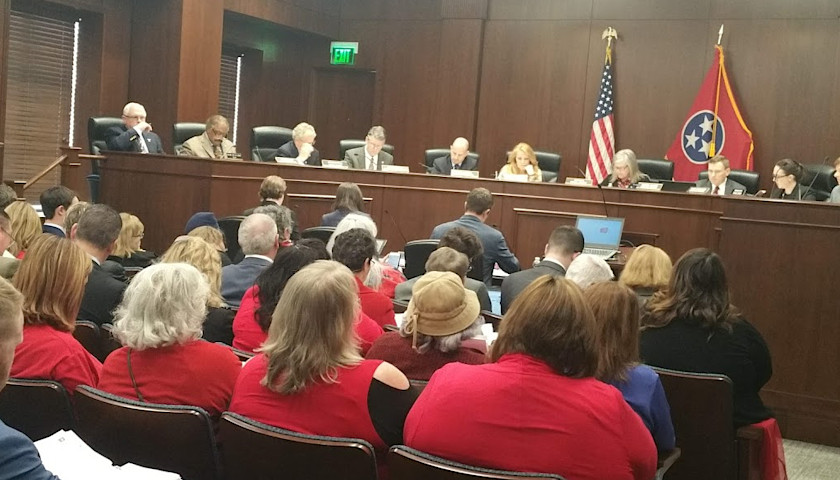
Herron expressed admiration for Dunn, having served with him in the Tennessee General Assembly, and then said that this was the most striking combination of an outstanding sponsor and a terrible bill he had seen in 30 years. He feels that this legislation has the potential to do great damage and great harm, pointing out gross misuses of the funds in other states.
He then seemed to call into question the capabilities of the Department of Education managing testing and the Achievement School District and now the additional responsibility of the ESAs.
Herron rattled off issues as his time was running short, saying the bill deserves more work by the subcommittee. He pointed out that there is no American history, Tennessee history or civics and that as long as the student uses the computer one percent of the time or less, the parents can watch porn on it 99 percent of the time, adding, “You’ve seen them and I’ve seen them and we know some of them.”
Moving on, Chair Moody went back into session at which time Representative Leatherwood (R-Arlington) said he wanted to state his concerns with the legislation, although he expressed that he thinks the Governor is trying to do the right things for the right reasons. Leatherwood listed several concerns including funds following the home-schooled students, even as a pro and former home school parent himself as well as a former school teacher.
Dunn closed on the bill saying that even without the $25 million, it’s a mathematical fact that the public schools would have more dollars per child if they leave. Contrasting it to his experiences years ago, Dunn said that when he walks into public schools now, he sees “pop, sizzle and a lot of things happening.” He says that public schools short-change themselves, alluding to resolutions from the school boards painting a picture of all the kids leaving.
“It would be nice if a school board stood up and said ‘bring it on. We’ve got great teachers, great curriculum, we’ve got a great community. We can compete with anybody.’”
The sense of doom and gloom, said Dunn, makes him wonder what they know that he doesn’t.
Tennessee education has momentum and because of what has been done in education, businesses and jobs can be recruited here, said Dunn. We know that jobs fix a whole lot of problems when we talk about poor people and families that need income.
Saying that there’s probably nobody who “nitpicks” bills more than he does, Dunn said he is willing to look at the concerns expressed to address them.
In the end, Dunn said look at those in the audience, we will spend less dollars but get better results as measured by where the parents go and their satisfaction with their child’s education.
As a procedural matter, the amendment numbered 6145 was added by unanimous voice vote to HB 0939. When HB 0939 bill, as amended with 6145 added to it was voted on, Chair Moody ruled that Ayes have it and the bill passes on to the full House Education Committee.
Requesting to be recorded as voting No were Representatives Vincent Dixie (D-Nashville) and Tom Leatherwood (R-Arlington).
Voting Aye were Chair Debra Moody (R-Covington) and Representatives Charlie Baum (R-Murfreesboro), John DeBerry (D-Memphis), Bill Dunn (R-Knoxville), and Mark White (R-Memphis).
Following the meeting, Justin Owen, President and CEO of the Beacon Center of Tennessee, a nonprofit, nonpartisan, and independent organization dedicated to providing expert empirical research and timely free market solutions to public policy issues in Tennessee, told The Star they are very pleased with the outcome.
“Obviously, we’ve been supporting ESAs and school choice for a long time. It’s been a long road over several years, but fortunately Governor Lee has taken a leadership role that we haven’t seen in the past. We have some new leadership in the House that makes it a higher priority as well. I know the full Committee will likely be a tougher vote, but we’re continuing to educate members about why it’s important to give parents these options. We think this bill is a really good start to that.”
With regard to the bill itself, Owen said, “There still has to be a lot of conversation about the details and what that’s going to look like with the implementation. We’re willing to help address that with members. We’ve worked on this for a while and we’ve seen how this has rolled out in other states and can explain some of those things.”
Owen said the arguments used by opponents about fraud can be mitigated and addressed, without restricting parents’ choice because one or two people may commit fraud, alluding to the 20 million Americans with health savings accounts where spending is limited to certain things and there are accountability provisions in place. He also said those who committed the fraud were prosecuted and while it can’t be completely eliminated, it can be mitigated.
Likening it to taking all cars off the road because some people might drive drunk, Owen told The Star, “That’s not a real solution to a problem, it’s just a scapegoat and an attempt to derail the bill. These are the same people that have been against giving parents more choice for years and years.”
With regard to testing, Owen told The Star it strikes a good balance for private schools to have testing for the things that matter with math and English, without undermining their ability to dictate their curriculum in science and social studies where there is a very different curriculum between private schools and public schools.
Owen concluded, “This is an important thing: You’ll hear the other side talk about systems and schools and adults and money. They don’t ever talk about what’s best for the kids, and it’s about time we do what’s best for the kids.”
– – –
Laura Baigert is a senior reporter at The Tennessee Star.
Photos of HB 0939 Discussion by Tennessee House Curriculum, Testing, & Innovation Subcommittee.

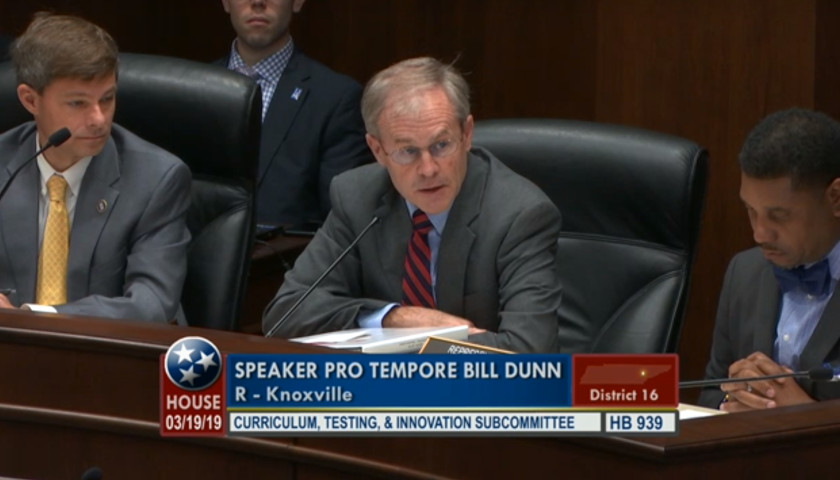

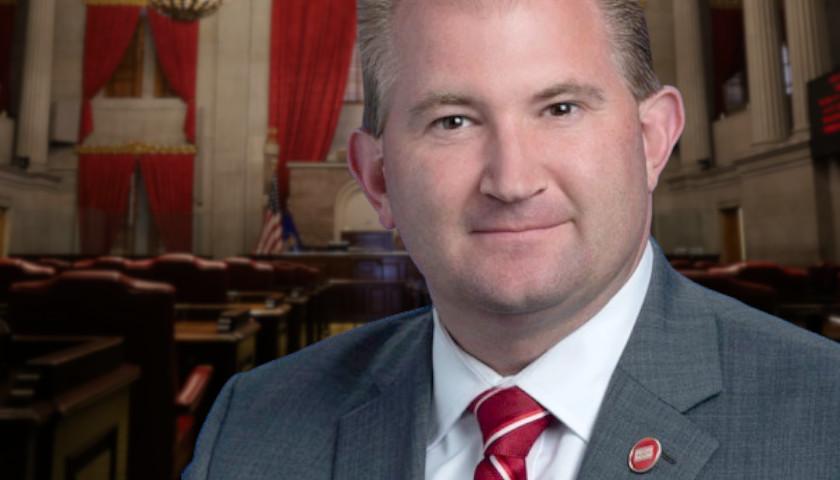


Competition is the ONLY thing that drives excellence! And why would any astute teacher be against multiple competitive school options? Look at what happened when “free agency” hit professional sports, pay across the board went way up! Or maybe it’s really that school bureaucrats and teacher unions don’t want their cushy gigs to end! Heaven forbid that they have to earn their 6 figure salaries!